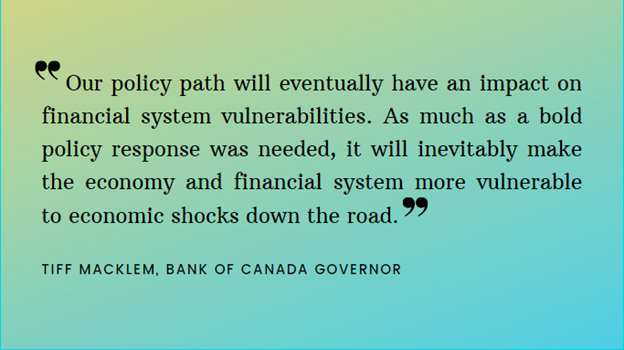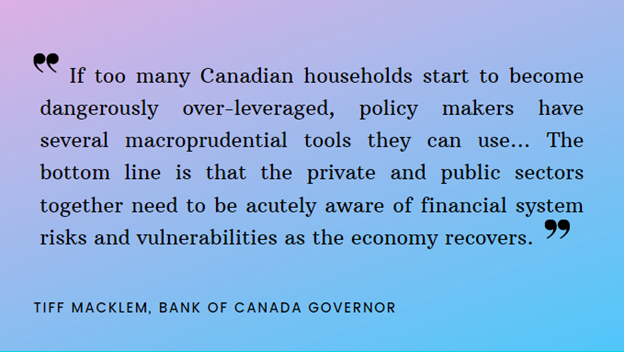The Bank of Canada (BoC) has been sturdy support system for the public in the midst of the coronavirus pandemic. The central bank took steps such as r
The Bank of Canada (BoC) has been sturdy support system for the public in the midst of the coronavirus pandemic. The central bank took steps such as reducing its rate of interest to near zero to deferring loan and mortgage payments to ease the pressure of the pandemic-led contractions in the economy. But such accommodations led to the creation of massive provisions for credit losses. While many analysts and political opponents have raised concerns about the impact of such credit losses on the big Canadian lenders, Bank of Canada governor Tiff Macklem continues to defend its COVID-related monetary policy.
In his speech at the Global Risk Institute on Thursday, October 8, Macklem stressed that the central bank’s initiatives to cut down the interest rate, purchase assets and take fiscal relief from the government have helped reduce the economic wreckage of the pandemic.
At the same time, however, he pointed in his speech that the increasing debt levels will give rise to future risks.
Macklem explained that the “bold” steps taken in order to combat with the challenging times will eventually render Canada’s economy and financial system “vulnerable to economic shocks” in the long run.
What Steps Did BoC Take Amid Pandemic?
Back in May 2020, the BoC slashed its benchmark interest rate from 1.75 per cent to 0.25 per cent, and has not changed it since. Macklem had assured later in July that the key interest rate will stay close to zero until the economic conditions in the country improve, which financial experts believe would not be until 2023.
The central bank also started purchasing government bonds worth at least C$ 5 billion every week in May, which it said will go on till the financial scenario improved. While reconfirming the key interest rate in September, the Bank said that it will continue with the quantitative easing policy and purchase of government bonds.
As the central bank initiated asset purchase programs to help the crippling credit markets, the Trudeau government pushed billions of dollars into the economy to keep it afloat amid the pandemic.
In his latest speech, Macklem asserted that these measures lessened the impact of the pandemic on the economy, else its carnage could’ve been “much, much worse”.
What Could be the Future Financial Vulnerabilities?
For starters, higher debt levels would be the top vulnerability to look for financially. With the BoC keeping its interest rate so low and the COVID-19 outbreak still putting up financial challenges, people are more likely to opt for loans. At a point when borrowers take on more debt than they can afford against their income, the cumulative debt levels will become worrying.
One of the factors that could contribute to the worry over debt levels is the soaring rate of home sales in Canada. According to the Toronto Regional Real Estate Board (TRREB), the Greater Toronto Area alone saw a surge of 42.3 per cent year-over-year in its total number of home sales in September. This was a new record high where approximately 11,000 houses were sold last month.
Macklem said that the government will be keeping an eye on the housing markets to make sure that people who are buying homes are not borrowing debts that outsize their income.
What is the Government For Economic Revival?
The Canadian dollar climbed 0.4 per cent against the US dollar on Thursday amid rising oil prices and Macklem’s hint at US stimulus in his speech.
Prime Minister Justin Trudeau, on the other hand, has expressed his fear of expecting “some disruptions” in case of a close call in the upcoming US presidential election. He added that his government is prepping for “any outcomes.”
Any form of polarization in the United States in the light of the election results could have a “potential impact” on the Canadian economy, Trudeau said.
The US presidential elections are less than a month away (November 3). Tensions are already running high and so far, the face-offs between President Donald Trump and Democrat Joe Biden have been less than cordial. Hence, gearing up for unfriendly scenarios following the results may not be the worst idea for the Canadian government.
Trudeau’s minority Liberal government, which survived the confidence vote on October 6, also laid out its plans to revive the economy amid COVID-19 during the Throne Speech in September-end.
In his promise to support financially suffering businesses, Trudeau extended the Canada Emergency Wage Subsidy (CEWS) until 2021. He also shared plans of expanding the federal employment insurance (EI) system and ensuring that those who are not covered under it are also supported. There were also commitments of expanding the Canada Emergency Business Account (CEBA) loan program and rejigging the Business Credit Availability Program (BCAP).
The government, however, has snipped the Canada Emergency Response Benefit (CERB), which expired on September 26.
What to Expect Now?
Even as the lockdown relaxes and the government gears up to give the economy a facelift, the recession will persist as long as the pandemic does. But so far, there have been improvements since the bottom-out situation in March. Canada’s employment rate, which was dwindling in the wake of the pandemic, saw 246,000 jobs being recouped in August, as per Statistics Canada. The BoC’s Financial System Review 2020 also insisted that the big six lenders in Canada have capital and mortgage insurance system sturdy enough to weather the pandemic.
So, at this point, all we can hope for is a light at the end of the tunnel sans another COVID-19 wave.
Source : kalkinemedia.com



